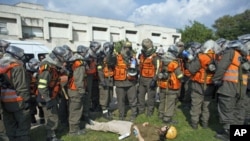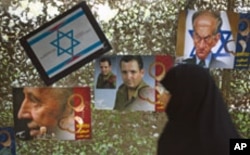Israeli leaders are urging the international community to stop Iran's pursuit of nuclear weapons after a U.N. agency said Tehran's nuclear program was not just for peaceful forces. There is debate in Israel about a possible military attack against Iran, but many opinion leaders say that should be a last resort.
The Israeli reaction came one day after a report by the International Atomic Energy Agency [IAEA] that said there is credible information that Iran was working to develop nuclear weapons.
Opposition leader Tzipi Livni said the IAEA report makes clear where Iran is heading.
"Iran threatens not only the interests of the free world, but the values of the free world. And this is something that needs to be defended. And we expect the international community, the free world, to stop Iran and prevent Iran from having a nuclear weapon," said Livni.
Iran postures, Israel prepares
Iran says its nuclear program is for civilian purposes only and that the U.N. report was based on lies.
Israeli Defense Minister Ehud Barak told Israel radio Tuesday that tougher sanctions should be imposed. He said it appears the international community is at "the last opportunity to impose drastic, internationally coordinated sanctions that would force Iran to stop" its nuclear weapons program.
Barak indicated that military attacks on Iranian nuclear installations, however, should be the last option.
In the days before the U.N. report was published, there was a flurry of media speculation that Israel's government was considering a military strike on Iranian nuclear facilities. Senior Iranian military officials warn that any attack against Iran will bring a severe response.
But Israeli President Shimon Peres said that such an attack was becoming more and more likely.
Focus on military option
Last week, the Israel military test-fired a ballistic missile. Israeli rescue and medical workers also held a drill near Tel Aviv to respond to a simulated foreign missile attack.
Media reports in Israel and Western countries said Netanyahu and Defense Minister Barak were trying to convince a divided Cabinet of the need for a military strike against Iran. There reportedly was resistance, though, from many ministers and senior military officials.
Israeli analyst Yossi Melman said the benefits from any Israeli attack against Iran would not justify the repercussions, which could include Iranian missile attacks on Israel and possibly a regional conflict. But he said tougher economic sanctions are not likely to work.
"I believe that it's not going to change the reality. Iran would continue with its efforts to have nuclear weapons. The sanctions would not be tough enough, and diplomatic measures are going to be exhausted. And we are, once again, in the same place, arguing about the military option," said Melman.
Barak said a military attack on Iranian nuclear facilities remains an option, though the least desirable one. And he said that while Israel prefers an international response, the country is, in his words, responsible for its own safety.
IRAN NUCLEAR TIMELINE

















